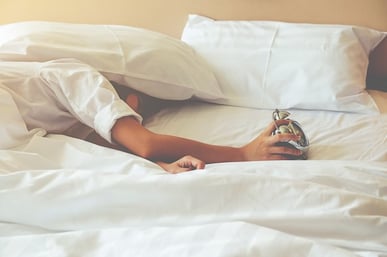May is Better Sleep Month. The Better Sleep Council kick-started the Better Sleep Month campaign to help adults understand the importance of a good night’s sleep. Quality sleep is an important factor in your everyday health. And unfortunately, it’s often overlooked. Without enough quality sleep, our physical, mental, and emotional health suffers.

Sleep deprivation is such a common problem in the United States that the Centers for Disease Control and Prevention (CDC) considers insufficient sleep to be a public health epidemic. Experts recommend that adults get seven to nine hours of sleep per night. According to a Gallup study, Americans only sleep an average of 6.8 hours each night, with 40% of Americans getting less than the recommended amount of sleep. This means that many Americans are suffering from the health consequences of poor sleep habits.
Inadequate sleep can lead to a variety of problems, including:
- High blood pressure
- Weight gain
- Mood swings
- Headaches
- Trouble concentrating
- Weakened immune system
- Stress
- Irritability
- Impaired judgment
- Accidents
- Heart problems
- Higher risk of developing type 2 diabetes
- Depression
- Skin aging
- Forgetfulness
As you can see, getting enough sleep is crucial to your health and wellness. To help celebrate Better Sleep Month and inspire you to practice better sleep habits, we are debunking some of the most common sleep myths and misconceptions. Read on to learn the truth behind some popular sleep myths.
Myth: It only matters how long you sleep.
While the duration of sleep is an important factor in maintaining healthy sleep habits, there’s a bit more to it than that. The quality of your sleep is actually more important than the quantity of sleep. For example, if one person sleeps for 10 hours, but only a few of those hours are quality sleep, then they really aren’t getting as much sleep as someone who slept for 8 hours with 7 of those hours being quality sleep.
A recent study shined some light on the quality vs. quantity debate. Researchers from the University of Sidney’s Charles Perkins Centre analyzed the sleep patterns of 14,557 Australians and found that poor sleep quality is linked to “worse functioning regardless of how long a person has slept for.” They also found that those with poor quality sleep – even when they slept for over eight hours – had the poorest functioning overall. This proves that it’s essential to not only focus on how much sleep you get but on the quality of that sleep as well. Check out this blog post for some tips on getting better quality sleep tonight.
Myth: There’s no such thing as too much sleep.
Unfortunately, there is such a thing as too much sleep. Sleeping too long comes with some risks similar to those who don’t sleep enough. Too much sleep on a regular basis can increase the risk of chronic disease, including type 2 diabetes, obesity, and heart disease. It can also interfere with cognitive functions and mood. According to Prevention, nearly 30% of adults in the United States are categorized in the group known as “long sleepers”. The problem with long sleepers is that this time spent in bed isn’t usually quality sleep – it’s just, well, more time spent in bed! For most adults, seven to nine hours of quality sleep is all you should need.
Myth: You can sleep more on the weekends to make up for lack of sleep during the week.
There’s no such thing as sleep “banking”. It’s unhealthy to sleep minimally over the workweek and oversleep on the weekend. While sleeping in a couple of extra hours on the weekend might help you feel more energized and refreshed, you’ll still deal with the long-term consequences of inadequate sleep from the rest of the week. Plus, sleeping in too late or napping excessively on the weekends can make it difficult to get to bed at a reasonable time on Sunday – creating a vicious cycle.
Myth: If you’re having trouble falling asleep, you should just keep laying in bed until you do.
Whether you’re having trouble falling asleep or wake up in the middle night and can’t fall back asleep, one of the worst things to do is to continue to lay in bed trying. This can cause anxiety about not getting enough sleep or cause your thoughts to wander – making it even more difficult to fall asleep. After about 30 minutes of unsuccessfully trying to fall asleep, get out of bed and leave your bedroom. Try to focus on a relaxing activity like reading, listening to calming music, meditating, or relaxation exercises. Don’t do anything that would energize you, like watching TV, using your phone/laptop, or eating. Engaging in relaxing activities should help you feel sleepier before you go back to bed.
Myth: Watching TV helps you fall asleep.
Falling asleep with the TV on is a recipe for poor quality sleep. The dim light emitted from TVs can disrupt your sleep and prevent you from reaching a deep level of sleep. The noise can also cause disruptions in your sleep pattern. Plus, if you’re watching something thrilling, it can keep your heart rate up and keep you energized longer. It’s best to read a book before going to bed or giving yourself an hour break between TV time and bedtime.
Myth: Alcohol helps you sleep.
It’s true that a nightcap can help you feel sleepy and fall asleep faster. However, consuming alcohol before bedtime can be very disruptive for your overall sleep. Studies have shown that alcohol can interrupt your circadian rhythm, prevent REM sleep, and aggravate breathing problems. Alcohol also acts as a diuretic, so it can lead to more trips to the bathroom throughout the night.
Myth: Sleep disorders are too difficult to treat.
According to the American Sleep Association (ASA), around 50-70 million American adults have a sleep disorder. Unfortunately, many people who suffer from a sleep disorder don’t seek help, fearing that treatment is a waste of time, or they simply just don’t have the energy to seek treatment. In many cases, adults with sleep disorders turn to sleeping pills, but this is not a long-term cure. Sleeping pills can do more harm than good. To effectively treat a sleep disorder, you should meet with a healthcare professional. They might suggest medication, better sleep habits, therapy, or a combination of tactics. Sleep disorders can be treated, and they shouldn’t be ignored.
We hope this list of common sleep myths helped you gain a better understanding of sleep and how important a good night’s sleep is. Celebrate Better Sleep Month by prioritizing your sleep this month!
Do you practice healthy sleep habits? Feel free to comment below!
Like this blog post? Share it with your employees or co-workers with this printable version of the blog!
Image created by Mindandi - Freepik.com



